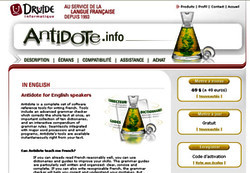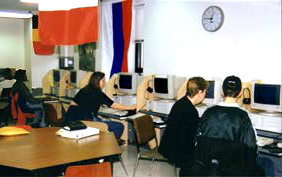Different Strokes for Different Folks
CLÉO, the Centre de langue écrite et orale, at Vanier is the nerve center of the French Department where Anglophone students polish their French skills to communicate effectively in Quebec society.
The department has embraced IT for more than twenty years and a wealth of resources await students not only on the web pages but in the language laboratory itself. Interestingly, IT in Vanier’s French department follows students wherever they have access to a computer.
Visiting the CAN 8 Virtual Lab explains how this process works. Students are asked to download the CAN 8 program onto their own computer. Once they’ve done this, they can open a host of exercises at all levels to practice their skills. The exercises are tightly coordinated with the material that they are studying. Students can also take a series of dictées of increasing complexity.
All work is automatically corrected, and teachers in the department can track the progress of each student in completing the assigned work through a page that gives them an overview of the progress of the class as a whole. Students that cannot successfully download the software are reminded that they must complete the work and are invited to do it in the lab which is open from 9 to 5 during weekdays.
Can 8 deals with four basic linguistic skills: reading, writing, speaking and listening at the more basic levels of competence. There are exercises on oral expression, grammar, written comprehension, and oral comprehension. Although there is material at the high intermediate level (102), the richest content lies with the lower levels, courses 001, 100 and 101. Material for the 100 and 101 courses has been developed by the author of the teaching method used in the department and is updated as new material in the books is added. Alex Borja, a former techncian at CLÉO, created a video which explains the potential of using the material on CAN8 for language learning.
The Can 8 solution is practical for lower level students, but higher level students need a resource that could rise to the challenge of the more complex writing and research possible as students acquire greater fluency in the language.
The department’s website contains a rich selection of links to French language cultural resources allowing its more advanced students to discover the wealth of material that opens for them using their second language skills. Biblio Branchée, a content management system, presenting newspaper articles in both languages is available.
In order to ease these students’ immersion into the Francophone cultural scene, desktops in CLÉO link to the Encyclopædia Universalis on-line, a French reference. Also, another important tool, Antidote, is at hand.

Antidote has a great page of information in English
What is Antidote? As the title of this article suggests, Antidote can be more than one thing depending on what your skills in French are and what your needs are at the time. Their own website gives a definition which is a great way to begin discussing how the software is used at Vanier:
Antidote is a complete set of software reference tools for writing French. Tools include an advanced grammar checker which corrects the whole text at once, an important collection of ten dictionaries, and an interactive compendium of grammar rules. Seamlessly integrated with major word processors and email programs, Antidote’s tools are available instantaneously right from your text.
Teachers in the department took an all-day training course to explore the potential of Antidote in their teaching. For the less advanced levels, the tool is a convenient dictionary. The student can refer to a collection of references, receiving easy access to synonyms, antonyms, definitions and verb conjugations.

Students and Staff at work in Cléo
More advanced students can let Antidote review their writing. The results are more than a simple correction. Using various filters and features, information about problems in usage and the irregularities of structure are presented at the most opportune moment in the writing process. The utility of the dictionaries, of course, remains as required at the more advanced levels.
Information Technology in the French Department at Vanier remains an important part of how second language skills are developed. The vibrancy of francophone culture comes alive through tools that deliver the message that communicating in French opens doors to a wide world that is exciting and extends beyond the closed doors of our classrooms.
Use our Reader Response Feature below to share your second language IT experiences with your colleagues.

